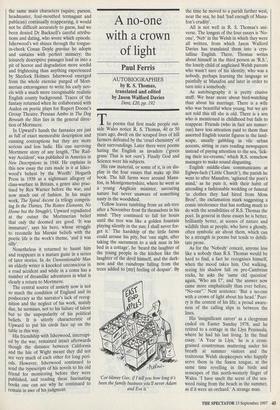A no-one with a crown of light
Paul Ferris
AUTOBIOGRAPHIES by R. S. Thomas, translated and edited by Jason Walford Davies Dent, £20, pp. 192 The poems that first made people out- side Wales notice R. S. Thomas, 40 or 50 years ago, dwelt on the scraped lives of hill farmers defeated by the 'cruel chemistry' of their surroundings. Later there were poems hating the English as invaders (`green grass/ That is not ours'). Finally God and Science were his subjects.
His raw material, or some of it, is on dis- play in the four essays that make up this book. The hill farms were around Mana- fon, in Montgomeryshire, where he went as a young Anglican minister, savouring nature but never unaware of something nasty in the woodshed.
Yellow leaves tumbling from an ash-tree after a November frost fix themselves in his mind: 'They continued to fall for hours until the tree was like a golden fountain playing silently in the sun; I shall never for- get it.' The hardship of the little farms could arouse his pity, but 'one night, after taking the sacrament to a sick man in his bed in a cottage', he 'heard the laughter of the young people in the kitchen like the laughter of the devil himself, and the dark- ness and the raindrops falling from the trees added to [my] feeling of despair'. By ror blimey Guy, if I tell you how long it's been the family business you'll never Adam and Eve it.' the time he moved to a parish farther west, near the sea, he had 'had enough of Mana- fon's crudity'.
All is not well in R. S. Thomas's uni- verse. The longest of the four essays is 'No- one', `Neb' in the Welsh in which they were all written, from which Jason Watford Davies has translated them into a crys- talline English. There, Thomas writes about himself in the third person as `R.S.', the lonely child of anglicised Welsh parents who wasn't sure of his identity, who was a nobody, perhaps learning the language so painfully at Manafon and later in order to turn into a somebody.
As autobiography it is pretty elusive stuff. We hear more about bird-watching than about his marriage. There is a wife who was beautiful when young, but we are not told this till she is old. There is a son who is mentioned in childhood but fails to reappear. Friends (who in fact are numer- ous) have less attention paid to them than assorted English tourist figures in the land- scape, usually gabbling in vile urban accents, sitting in cars reading newspapers instead of paying attention to the sea, 'lick- ing their ice-creams,' which R.S. somehow manages to make sound disgusting.
English middle-class communicants at Eglwys-fach (`Little Church'), the parish he went to after Manafon, 'agitated the poet's mind,' as he puts it, with their habit of attending a fashionable wedding or funeral `in clothes they had hired from Moss Bros!', the exclamation mark suggesting a comic intolerance that has nothing much to do with the sensibilities of R.S. Thomas the poet. In general in these essays he is better, brilliantly better, at scenes of nature and wildlife than at people, who have a ghostly, often symbolic air about them, which can be a strength in poems but tends to debili- tate prose.
As for the 'Nobody' conceit, anyone less like a nobody than R.S. Thomas would be hard to find, a fact he recognises himself, when the mood takes him. Out walking, seeing his shadow fall on pre-Cambrian rocks, he asks the 'same old question' again, 'Who am I?', and 'the answer now came more emphatically than ever before, "No-one".' Next sentence: 'But a no-one with a crown of light about his head.' Poet- ry is the context of his life; a proud aware- ness of the calling slips in between the lines.
His 'insignificant career' as a clergyman ended on Easter Sunday 1978, and he retired to a cottage in the Llyn Peninsula, where he had his last living. In the final essay, 'A Year in Llyn,' he is a cross- grained countryman muttering under his breath at summer visitors and the traitorous Welsh shopkeepers who happily serve them in the Saxon tongue, at the same time revelling in the birds and seascapes of this north-westerly finger of Wales. 'I have smelt the scent of the sea- weed rising from the beach in the summer, as if it were an orchard.' A strange man.


































































 Previous page
Previous page